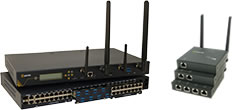
Report: Modular data centers offer expandability
By Donna DonowitzFebruary 1, 2011
A recent Consulting-Specifying Engineer Magazine report said modular construction techniques have been popular for decades. However, modular design is only recently becoming feasible in the data center because the equipment requirements associated with data centers made the architecture unrealistic in the past.
According to the report, there are three primary ways to construct a modular data center - container, industrialized and traditional. Container modular data centers involve building a shell facility and filling it with new server racks sent in on shipping containers. Each container is then clustered in a portion of the facility which is supplied with the necessary power and cooling capabilities. As the data center expands, new containers are brought in and new power and cooling infrastructure is created.
Industrialized modular data centers are similar to the container style, but involve building the facility itself in intervals when new containers are necessary. Each portion of the facility is given its own power and cooling setup, and connected to a central spine that unites the structure, the report said. This allows for even more flexible expansion than container models, according to the report.
Traditional modular data centers are essentially a typical data center built with room for expansion. The report said these can be just as efficient and expandable as container and industrial models, but can also be challenging to upgrade because every new rack installation needs to fit within the facility's initial power and cooling design.
Overall, the report said either of the three types of modular data centers are capable of offering improved expandability, efficiency and reliability. They are more expandable because they are purposely designed for new additions. Improved efficiency is achieved in modular data centers because easy installation allows technicians to manage workloads to maximum affect, the report said. Reliability is also superior, according to the report, because extra equipment is typically available to support any system failures that occur.
A recent report from Data Center Knowledge calls the growing movement toward modular data centers one of the biggest trends in the industry. Modular data centers are often capable of helping businesses expand their operations to move toward future needs while also providing short-term benefits, according to the report.



